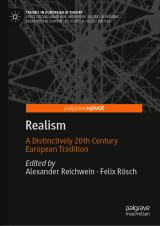Details

Realism
A Distinctively 20th Century European TraditionTrends in European IR Theory
|
CHF 71.00 |
|
| Verlag: | Palgrave Pivot |
| Format: | |
| Veröffentl.: | 26.12.2020 |
| ISBN/EAN: | 9783030584559 |
| Sprache: | englisch |
Dieses eBook enthält ein Wasserzeichen.
Beschreibungen
<div><p></p><p>This book examines how IR’s European realist tradition evolved in Europe and, due to emigration, in the United States in the 20th century. It includes an introduction and eight chapters, focusing on historical classical and contemporary structural branches of realist IR theorizing in historical and political contexts in which realist thinking did develop. It reminds us of realist key figures, such as Edward H. Carr, John H. Herz or Hans J. Morgenthau, but also of almost forgotten realists such as Raymond Aron, Stanley Hoffmann or Nicholas J. Spykman. Given IR mainstream textbooks introducing realism as a conservative American Cold War theory, this selection aims to reintroduce realism as a primarily and distinctively European, liberal, normative and critical tradition. A tradition that is almost always misunderstood as a guide for practitioners how to maximize or at least preserve power in the name of the national interest no matter the cost, but thatis in fact an argument against reckless and crude power politics, ideology and totalitarianism. This book is an invaluable resource for scholars, practitioners and students interested in the realist tradition in IR.</p> <p></p></div>
Chapter 1. Introduction<b>:</b> European 20<sup>th</sup> Century Realists – ‘Travellers between all worlds’.- Chapter 2. Between kratos and ethos: Thinking through the ritual in the work of Friedrich Meinecke.- Chapter 3. Edward H. Carr and Carl Schmitt: Interwar Realism's Not So Strange Bedfellows.- Chapter 4. Weimar in America: Central European Émigrés, Classical Realism, or How to Prevent History from Repeating Herself.- Chapter 5. <b> </b>John Herz and the Purposes of Realism.- Chapter 6. Nicholas Spykman’s Interactional Realism: Irony, Social Theory, Political Geography.- Chapter 7. The Christian Realist Pendulum: Between Pacifism and Interventionism.- Chapter 8. The Germans and the Frenchmen: Hoffmann’s and Aron’s Critiques of Morgenthau.- Chapter 9. When Martians Go to Venus: Structural Realism in Europe.
<p><b>Alexander Reichwein </b>is Lecturer in International Relations at the Department of Political Science at the Justus-Liebig-University Giessen, Germany. </p>
<p><b>Felix Rösch</b> is Associate Professor in International Relations at Coventry University, UK. </p>
<p><b>Felix Rösch</b> is Associate Professor in International Relations at Coventry University, UK. </p>
<p>This book examines how IR’s European realist tradition evolved in Europe and, due to emigration, in the United States in the 20th century. It includes an introduction and eight chapters, focusing on historical classical and contemporary structural branches of realist IR theorizing in historical and political contexts in which realist thinking did develop. It reminds us of realist key figures, such as Edward H. Carr, John H. Herz or Hans J. Morgenthau, but also of almost forgotten realists such as Raymond Aron, Stanley Hoffmann or Nicholas J. Spykman. Given IR mainstream textbooks introducing realism as a conservative American Cold War theory, this selection aims to reintroduce realism as a primarily and distinctively European, liberal, normative and critical tradition. A tradition that is almost always misunderstood as a guide for practitioners how to maximize or at least preserve power in the name of the national interest no matter the cost, but that is in factan argument against reckless and crude power politics, ideology and totalitarianism. This book is an invaluable resource for scholars, practitioners and students interested in the realist tradition in IR.</p><p><b>Alexander Reichwein </b>is Lecturer in International Relations at the Department of Political Science at the Justus-Liebig-University Giessen, Germany. </p><p><b>Felix Rösch</b> is Associate Professor in International Relations at Coventry University, UK. </p>
Offers a concise veduta of the European 20th century realist tradition in IR, and its key figures in political and historical contexts Provides a critical appraisal of the trajectories of the European realist tradition and its different approaches, and how they did evolve Extends an invitation to reconstruct and contextualize the realist tradition to disclose its distinctively European origins and roots, and to strengthen its European identity


















